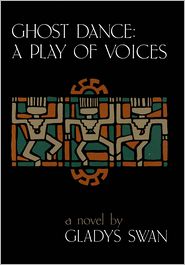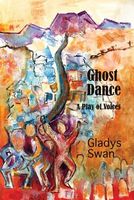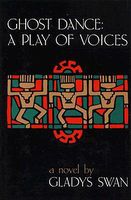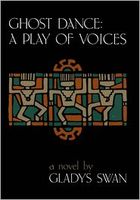- Welcome to FictionDB, Guest
- | My Account
- | Help

Ghost Dance — Gladys Swan
hloride, New Mexico, is a dusty mining town slowly bleaching away in the sun, a casualty of the big copper firms' exodus to South America. To the dying place returns Roselle More -- hometown girl and faded Hollywood star -- for the premiere of her new film. The even is a cynical promotional gimmick, one that her director, Bill Brodkey, making a last-ditch attempt to affirm his own artistic integrity, hopes will also resurrect the actress' bottomed-out career. Naturally the citizens of Chloride hope the publicity will do the same for their town. But Roselle vanishes. A double assumes her place -- and suddenly nothing is as it seems. In this eerie, beautifully crafted novel, Gladys Swan presents an impressionistic palimpsest of myth and modern life, in which the present is revealed as only a play of light and shadow over a ghost dance that -- tenuously -- ensures the world's continued existence. Part history, part myth, part meditation on truth and illusion, the novel becomes a kaleidoscope of plots and subplots, each refracted through the perceptions -- the voices -- of a cast of characters as intriguing as the Southwest itself. And as the town giddily whirls toward its rendezvous with truth, these characters find themselves precariously balanced between a lost past of blood-deep spirituality and an unknowable, terrifying future, between the world of drama and the drama of the world. Presiding over and in some mysterious way engineering this ultimate rendezvous is the oracular A.J. ("Bird") Peacock, archetypal trickster, Oberon, Puck, Prospero to the town. Truth, Bird points out, is not always comforting. The truth (or a truth) is finally revealed when the voices of the title -- of the past, the land itself -- speak during the novel's apocalyptic conclusion. There, in the wilderness, in a dazzling play within a play, the past comes face-to-face with the present, the spiritual with the profane. In this crowning union of memory and desire, this shoring-up of fragments against ruin, the discerning reader will hear echoes of writers as disparate as Shakespeare, T.S. Eliot, and Joyce. Never less than consummately entertaining, Ghost Dance: A Play of Voices works flawlessly on many levels at once. The demands of this remarkable novel are great, but so are its rewards.
Genres
Click on any of the links above to see more books like this one.




